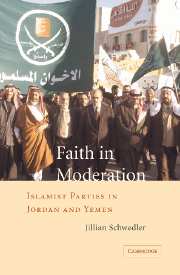Book contents
- Frontmatter
- Contents
- List of Figures
- List of Tables
- Preface
- Acknowledgments
- List of Abbreviations
- Note on Transliterations and Translations
- Faith in Moderation
- 1 Moderation and the Dynamics of Political Change
- 2 Political Liberalization as a Mechanism of Control
- 3 Public Political Space
- 4 Cultural Dimensions of Political Contestation
- 5 Justification and Moderation
- 6 Conclusion: Does Inclusion Lead to Moderation?
- References
- Index
- References
References
Published online by Cambridge University Press: 18 December 2009
- Frontmatter
- Contents
- List of Figures
- List of Tables
- Preface
- Acknowledgments
- List of Abbreviations
- Note on Transliterations and Translations
- Faith in Moderation
- 1 Moderation and the Dynamics of Political Change
- 2 Political Liberalization as a Mechanism of Control
- 3 Public Political Space
- 4 Cultural Dimensions of Political Contestation
- 5 Justification and Moderation
- 6 Conclusion: Does Inclusion Lead to Moderation?
- References
- Index
- References
- Type
- Chapter
- Information
- Faith in ModerationIslamist Parties in Jordan and Yemen, pp. 217 - 244Publisher: Cambridge University PressPrint publication year: 2006



